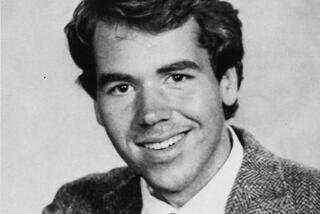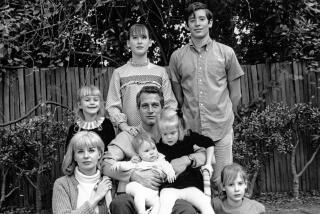Preview: Los Angeles Times Book Festival at UCLA
In an age when economic downturns and new technology pose huge challenges to the publishing world, public events — like the Los Angeles Times Festival of Books this weekend at UCLA — offer a different type of interactivity than can be found either on the page or screen.
The book business has taken a beating in the national recession, and the latest figures from the Assn. of American Publishers are not encouraging: Sales dropped 1.8% in 2009 to $23.8 billion. E-books registered the biggest single gain, with sales of $313.2 million, although they’re still a relatively small share (just above 3%) of the overall market.
In the days leading up to this year’s Festival of Books, participating authors, literary agents and publishing pundits offered divergent views on these trends, but all agreed on one point: No matter how much growth there might be in the digital book world, there will always be a hunger among readers to connect with each other and talk about writing.
“Book festivals give people a chance to experience their love of books in the physical presence of other people, and not just as disembodied, flickering words on a screen,” said Jonathan Kirsch, an author, publishing lawyer and contributor to The Times book section, who will moderate the “Stories of Survival” panel Saturday afternoon. “You don’t get this online.”
As e-book reading devices grow in popularity, some industry experts are celebrating the birth of a new market; others wring their hands over a growing threat to bookstores and the economic infrastructure of publishing. Betsy Amster, a Los Angeles literary agent who will moderate the “Inside Publishing” panel at the festival on Sunday afternoon, voiced concern that e-books could eventually “decimate” the business model for selling books.
“I say this, mind you, as someone who owns, and loves, a Sony Reader,” she added. “I’ve seen exponential growth in e-book sales for some of my clients in just the last year — generally those who already have a readership. For the most part, sales are still modest for those who are just starting out. I worry, like every literary agent who lives to launch new authors, that the pressure publishers feel to publish authors who are known quantities will only intensify.”
Like many book lovers, Kirsch laments the economic changes that are in some cases decimating the publishing industry. In particular, he mourns the loss of one independent bookstore after another.
“For me it was Dutton’s in Brentwood,” he said. “I was there often. I’d see my friends and colleagues, writers and booksellers whom I knew and liked. And I can no longer go there. But at least once a year you can still have that kind of experience at the Festival of Books.”
Others come to savor the aesthetic beauty of books. For novelist Jane Smiley, one of the chief attractions of a book festival is the variety of cover designs on display. Publishers invest a lot of time in such artwork, and the quality has improved greatly in recent years, said Smiley, who will be on the “Unstoppable Voices” panel on Sunday.
“If electronic books diminish that, it will be a shame,” Smiley said. “I love the books on my shelf, not just because they promise me good reading but because they are so beautiful to look at in the first place.”
“There will always be people who want to touch real books,” said biographer A. Scott Berg, who will moderate the panel “20th Century Lives” on Saturday afternoon. “And what you see at a book festival is hundreds of people pawing, manhandling and fondling books. There’s a shared experience here, a tradition that doesn’t change. I wonder if mothers will be cuddling up with 3-year-olds to look at an e-reader in the future.”
The creators of Apple’s new iPad anticipated that question: They’ve run full-page ads in newspapers with a picture of a mother with a child in her lap, both of them holding the reading device and turning the pages of “Winnie-the-Pooh.”
For some, the physical format of a book is less important than the content’s enduring popularity, and they see festivals as just one kind of communication in a changing book world. Lisi Harrison, who writes novels for teens and will be appearing on the panel “Girls Just Wanna Have Fun” on Sunday afternoon on the Young Adult stage, says interactive websites that bring readers together play an equally important role. She can’t imagine her creative universe without them.
“I’ve benefited tremendously from these trends,” she said. “Instead of talking to five girls at a time, my book groups consist of thousands. Every Wednesday I blog on my website, and each week I get thousands of comments. I post pages I wrote that day, and I ask fans to choose which author photos to put on my latest book. All of these girls love to answer me, and for a writer that is truly invaluable.”
For some literary world watchers, the medium is less important than the message. “The important thing is that people still want to read books,” said author Miles Corwin, who will moderate the “Mystery: Crime and Punishment” panel Saturday afternoon. “In Dickens’ day, people read portions of books in serial magazines, and they were still as hungry for the stories as when people read them decades later in one-volume editions. It doesn’t matter how it’s presented as long as there is still a thirst for books.”
The attraction isn’t disappearing any time soon, he suggested. Physical books “have become an integral part of a night out these days, even in auto-centric Los Angeles. You go out for a night in Pasadena, or to the mall in Santa Monica, you have dinner, park your car, see a movie and then you go to a bookstore. That’s an encouraging routine.”
But others fear those rituals could be in danger.
“The accelerating pace of change has forced book lovers to, well, change their ways,” said historian and author Joyce Appleby, who will be a panelist on “Does the American Economy Have a Future?” on Sunday morning. “First they had to contend with the disappearance of their favorite little bookshop. No sooner had they got used to the new Borders or Barnes & Noble in their town than along came an invitation to buy books on the Web at a site with the strange name of Amazon.com. Now the book itself may be on the way out.”
But whether they’re read on paper, on screen or on whatever the future may hold, a book is still, in the end, a book. “We can’t expect everyone to come to the books they read from exactly the same path,” said Laura Miller, literary critic for Salon, who will be participating in “The Art of the Critic” and “Fiction Outside the Margins” on Sunday. “We have to cultivate all the paths.”
More to Read
Sign up for our Book Club newsletter
Get the latest news, events and more from the Los Angeles Times Book Club, and help us get L.A. reading and talking.
You may occasionally receive promotional content from the Los Angeles Times.






